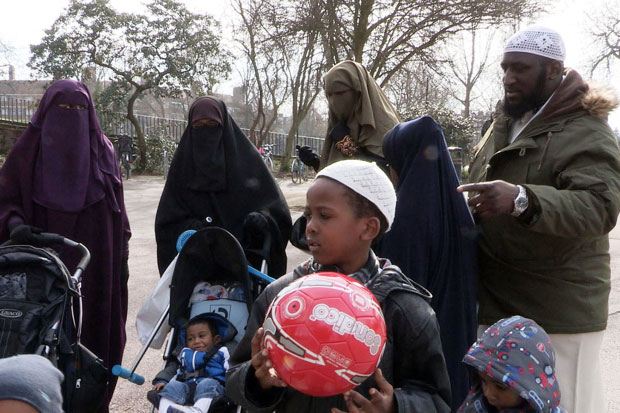Needless to say, it’s not uncommon to hear single British women in their thirties and forties saying that all the good men are married. But in The Men with Many Wives (Channel 4, Wednesday) this came with a twist: it turned out to be precisely the reason why you should marry them too. Polygamy may be illegal in Britain, but it’s permitted under the Sharia law that many Muslims here apparently live by — and, as several of the programme’s participants told us, there’s no better guide to whether a man is husband material than the fact that he’s a husband already.
Take Nabilah, who came to Britain from Malaysia to do a PhD in engineering at Cambridge. By then she was divorced and wanted someone with a proven track record of staying with his spouse. She therefore abandoned her studies to become the second wife of Hasan, a Jamaican from Brixton who’d converted to Islam at 16 and who now proved an unfailingly genial guide to the whole polygamy business, including the need to divide your time scrupulously between any wives you might have. His own preference was for three nights in south London with his first wife and their two children, followed by three nights in north London with Nabilah and their two.
Or at least it was, until he married a third: a divorced driving instructor in her mid-40s called Anub. Fluent in the language of human rights, Hasan clearly regards himself as a liberal kind of guy, which is why he doesn’t insist that his wives be virgins. (‘That’s discrimination,’ he said firmly.) He does, however, draw the line at them not wearing the veil. Anub had never worn one before, but as Hasan told us, ‘People cover their cars, their valuables …it’s protection for me.’
Like all documentaries about Islam, The Men with Many Wives trod carefully. There was, for example, no exploration — or even mention — of the legal and societal implications of having two co-existing and contradictory laws governing family life. Everybody involved was also allowed to make their points entirely unchallenged, with the off-screen voice neither asking Nabilah why she left academia nor putting it to Hasan that most people don’t in fact cover their cars.
Nonetheless, the programme did certainly let us glimpse the possibility that not all the women involved were delighted with their lot. According to Mizan, who runs an east London marriage bureau with more than 50,000 clients, ‘We’ve got a massive oversupply of women in their thirties, forties, divorced. The majority of them want a monogamous relationship but it’s difficult, and more and more are considering becoming co-wives’ — a state of affairs he interpreted as proof that polygamy is ‘driven by the women, not the men’. Again, this was a theory the programme left unchallenged, even when he later added that ‘women are looking for security’, but ‘men are more driven to polygamy, and for 80 per cent of men it’s sexually driven. The guys are looking for one thing: it’s the body.’
As for Hasan, a more self-doubting man might conceivably have revised his rosy view of contented polygamy in the light of his decision not to invite his other two wives to his third wedding: ‘Even though they’re accepting of polygamy, you don’t want to rub it in their faces. You don’t expect them to be happy or have a party about it. You’re not doing it for them.’
By comparison, the various wives taking part didn’t say a great deal. One made the slightly odd point that a polygamous marriage spares you the problem faced by many monogamous women: that of wondering where your husband is at night and whether he’s with somebody else. (Presumably because you know he is.) Another added an unexpectedly racy note by explaining that ‘the Prophet says you must have foreplay’. But perhaps the most telling female remarks tended to consist of the same single word. One wife was asked if she missed her husband when he was away; a second, if she ever wished she didn’t have to share him; and a third, if she sometimes felt jealous. The answer in all cases was ‘yes’ — often followed by an indulgent chuckle from their men.
The Driver (BBC1, Tuesdays) belongs firmly to what might be called the Manchester school of modern TV drama. Generally written by people who cut their teeth on Clocking Off, Shameless or both, these are shows characterised by middle-aged men in crisis, sharp dialogue between salt-of-the-earth Mancs and an almost complete disregard for the unsaid. Luckily, in their crunching way, they’re also usually pretty good — and with its strong cast and winningly noirish atmosphere this one feels as if it will be too.
David Morrissey plays Vince McKee, a depressed middle-aged taxi driver, with plenty to be depressed about. His son has left home in what, after the first episode, remain mysterious circumstances. His scornful daughter has a boyfriend of more than average obnoxiousness. His passengers, when not loudly criticising his chosen route, are either vomiting or urinating in his cab.
But then Vince met his old pal Colin (Ian Hart), who’d just been released from prison after a sentence so lengthy that he was aghast to discover you couldn’t smoke in pubs. Colin in turn introduced the cash-strapped Vince to a bloke, ominously named ‘The Horse’ (Colm Meany), whose offer of serious money for becoming the driver for his criminal gang Vince duly couldn’t refuse. Now, of course, he’s In Over His Head…
Admittedly, there’s still no denying that The Driver does create an unignorable sense of déjà vu. Yet, as cunning combinations of familiar elements go, it’s shaping up rather nicely.






Comments